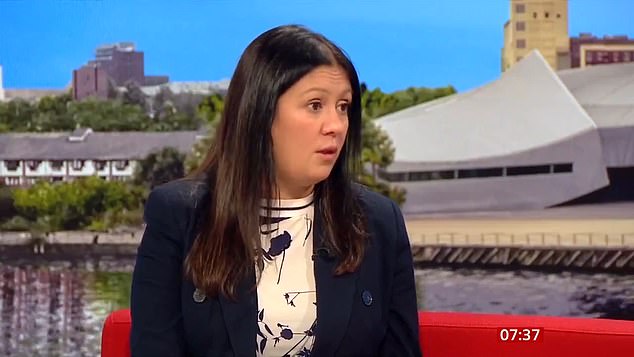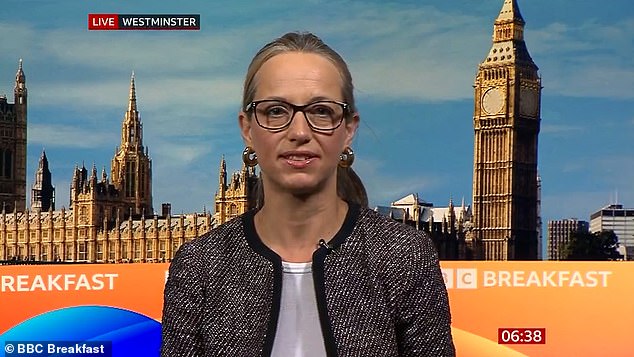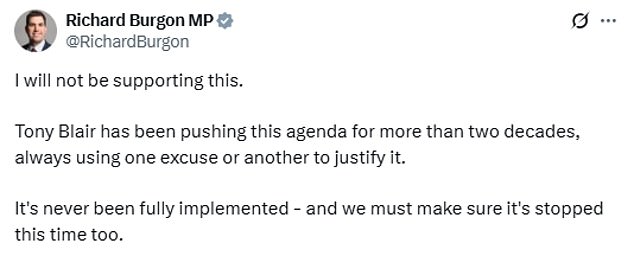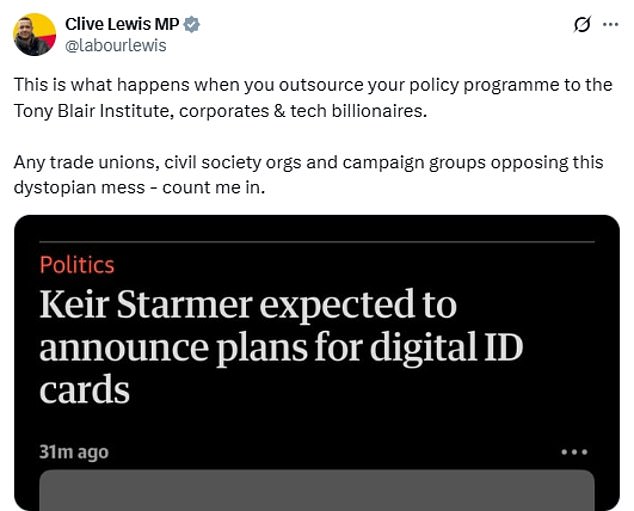Sir Keir Starmer is today facing major questions over how his ‘mandatory’ digital ID scheme will actually work – after flailing ministers denied it was compulsory.
The Prime Minister is set to officially unveil his ‘dystopian’ scheme in London today as his Government scrambles to crackdown on small boat crossings by making it harder to work in the UK illegally.
But the huge political gamble has already descended into chaos amid confusion over whether the digital IDs will be mandatory and how it could discriminate against millions of vulnerable citizens who don’t have smartphones.
In an official announcement to the media which left many questions unanswered, the Government said: ‘Digital ID will be mandatory for Right to Work checks by the end of the Parliament.’
But Culture Secretary Lisa Nandy later insisted that ‘although all UK citizens will have a digital ID, it will not be mandatory for people to use it’. ‘It will be entirely their choice,’ she added.
She then clarified that the digital ID ‘will be compulsory if you want to work in this country’.
MPs from across the country – including members of the Labour Party – have reacted furiously to the plans, warning it is a ‘a desperate gimmick that will do nothing to stop the boats’.
Tory MP Helen Whately claimed Sir Keir was using the scheme as a ‘smokescreen’ for his ‘failures’ to stop the boats and smash the gangs as well as to ‘distract’ from a series of scandals involving Angela Rayner, Peter Mandelson and Morgan McSweeney.

Culture Secretary Lisa Nandy was quizzed on the digital ID scheme today – but added to confusion over whether it is ‘mandatory’ or not

Tory MP Helen Whately (pictured) claimed Sir Keir was using the scheme as a ‘smokescreen’ for his ‘failures’
The PM is also facing questions to clarify how the scheme will work – including how much it will cost the British taxpayer and whether it could leave the personal details of millions of people vulnerable to hackers and state-sponsored cyber attacks.
While the Labour leader has said that the digital ID cards will be free, he has still not revealed in detail how the scheme – which experts warn will cost billions of pounds – will be paid for with the economy already in a dire state.
The idea of a mandatory identification system has long been advocated by Labour as a way to tackle illegal migration.
When Sir Tony Blair first pushed for ID cards two decades ago, Britain was a very different place with far less people using smartphones and social media and there was an expectation of privacy.
Today, with tension at an all-time high over free speech and civil liberties in the UK, critics warn that this is simply the latest authoritarian nightmare.
In 2006, Labour’s attempts to bring in ID card racked up a £250million bill before it was scrapped by the Conservative-Liberal Democrat coalition government.
According to the Institute for Government, there were 15,000 ID cards in circulation by the time the coalition came into power in May 2010.
Adding to the confusion, shortly after Labour returned to power in a landslide election last year, it ruled out digital ID cards with then-Home Secretary Yvette Cooper declaring ‘that’s not our approach’.
Two decades on from their last attempt, most of us do use smartphones, illegal migration has spiralled out of control and privacy is being breached more and more.
But civil liberties groups warned that older and vulnerable people could be ‘locked out’ from essential services.
Tory MP Helen Whately told BBC Breakfast: ‘This is just a smokescreen for Keir Starmer’s failures. He’s trying to distract everybody from the situation he’s got himself into. He has failed to stop the boats, he’s failed to smash the gangs.
‘He’s had all these scandals – Angela Rayner, Peter Mandelson, now Morgan McSweeney and the questions about donations from Labour together and he’s got Andy Burnham contesting him to be leader of the Labour party even though he has this huge majority in parliament.
‘He’s desperately looking for a distraction for those failures. That’s why he’s come out suddenly with this policy on ID cards which previously his government said they wouldn’t do.
‘On the question itself, the Conservative party opposes the introduction of mandatory ID cards. We don’t want to become a country where people might be stopped in the streets and asked to show their ID.’
Culture Secretary Ms Nandy has added to the confusion of the scheme this morning, saying all UK citizens will have to have the digital ID but they can choose whether they use it.
‘Although all UK citizens will have a digital ID, it will not be mandatory for people to use it. It will be entirely their choice,’ she told Sky News.
She referred to debates over identity cards that go back to when Sir Tony Blair was prime minister between 1997 and 2007.
‘We’ve debated it ever since. It’s important, of course, that we protect people’s civil liberties, and we have got no intention of pursuing a dystopian mess.
‘But I do think for most people, this is a fairly common sense and practical measure.’
Businesses will continue to face the same penalties they currently do for failing to confirm that employees have the right to work.
‘Companies already are meant to check on whether people have the right to work in the UK and face penalties for that … they will continue to face those penalties,’ Ms Nandy told Times Radio.
She said the change would make a ‘significant dent’ in the number of people who are able to work illegally because current documents can be too easily falsified, in comments to BBC Breakfast.
A national insurance number ‘won’t be sufficient’ in future to prove employment rights, she said.
‘So they’re not linked, for example, to photo ID, so you can’t verify that the person in front of you is actually the person whose national insurance number that you’re looking at, and we’ve seen a real rise in the amount of identity theft and people losing documents and then finding that their identity has been stolen.’
Ms Nandy said if people are challenged, they will need to show a digital ID to show their ‘right to work’ – but that it won’t need to be shown to get benefits or access to the NHS.
Sir Keir is set to detail his digital ID scheme at the Global Progress Action Summit in London alongside Australian prime minister Anthony Albanese and Canadian prime minister Mark Carney.
These plans will then be subject to a consultation and are expected to require legislation. The UK is one of the few countries in Europe without an ID system.
The digital ID is likely to be on a smartphone app, rather than a physical card.
A previous UK scheme – ultimately abandoned – relied on a digital photograph which could be used to confirm someone’s identity by measuring the precise distance between their facial features.
It is possible that any new scheme would require holders to also provide other biometric details – such as fingerprints.
Details on the card could be cross-referenced against a central database, holding tens of millions of records for the British population.
Because it is likely to be smartphone-based the project could also use the facial ID features widely used on phone handsets, in personal banking apps, for example.

Sir Keir Starmer was today facing major questions over how his mandatory digital ID scheme will actually work – after flailing ministers denied it was compulsory

Some Labour MPs are already vowing to oppose Sir Keir’s latest big idea, which comes as he struggles to stabilise his teetering government

However, the Government is thought to be some distance away from coming up with detailed proposals.
Major questions remain on how much the scheme will cost the British taxpayer.
It is likely to cost billions as the IT systems would most likely have to be developed from scratch.
Depending on the specification of the card, it could require a network of centres across the country where members of the public provide their biometrics.
Labour says the card could be used to prove someone is who they say they are, and that they have the right to be in Britain.
Sir Keir is using it as a scheme to crack down on illegal working – which would theoretically reduce the attraction of Britain to small boat migrants and other illegal immigrants.
It would also make life harder for foreigners who come to Britain legally but then fail to leave, and yet carry on working.
Further uses of the card could be in other situations where people have to prove they have the right to be in Britain – such as the ‘right to rent’ a property.
But there are also questions over what would happen to those who don’t have smartphones.
This group is likely to include a large number of elderly people.
If they, or others, were penalised under the scheme it would risk being dubbed discriminatory.
A solution could be providing an alternative way to access the details normally held on a digital ID card – perhaps using a laptop or desktop computer – when necessary.
Many also believe it yet another invasion of their privacy.
Pressure group Big Brother Watch has said the plan suggests Britain is ‘sleepwalking into a dystopian nightmare’.
Nigel Farage said the plan would ‘make no difference to illegal immigration, but it will be used to control and penalise the rest of us. The state should never have this much power.’
Kemi Badenoch branded the idea a ‘a desperate gimmick that will do nothing to stop the boats’, while Tory justice spokesman Robert Jenrick said Sir Keir would ‘try literally anything other than fixing the root of our problems: our broken legal system that stops us deporting illegal migrants.’
Reform UK called the plans a ‘cynical ploy’ designed to ‘fool’ voters into thinking something is being done about immigration.
The Liberal Democrats said they would not support mandatory digital ID where people are ‘forced to turn over their private data just to go about their daily lives’.
Meanwhile, Sir Tony Blair’s think tank said the IDs could act as a ‘gateway to Government services’.
Labour MP Richard Burgon said: ‘I will not be supporting this. Tony Blair has been pushing this agenda for more than two decades, always using one excuse or another to justify it. It’s never been fully implemented – and we must make sure it’s stopped this time too.’
A petition demanding policy is dropped has gone through the 500,000 barrier this morning.
The left of the Labour party are not keen on the plan, with Clive Lewis and Richard Burgon already publicly denouncing it and demanding the scheme is ‘stopped’.
In a statement released ahead of his landmark speech later today, Sir Keir said: ‘I know working people are worried about the level of illegal migration into this country. A secure border and controlled migration are reasonable demands, and this government is listening and delivering.
‘Digital ID is an enormous opportunity for the UK. It will make it tougher to work illegally in this country, making our borders more secure.
‘And it will also offer ordinary citizens countless benefits, like being able to prove your identity to access key services swiftly – rather than hunting around for an old utility bill.’











